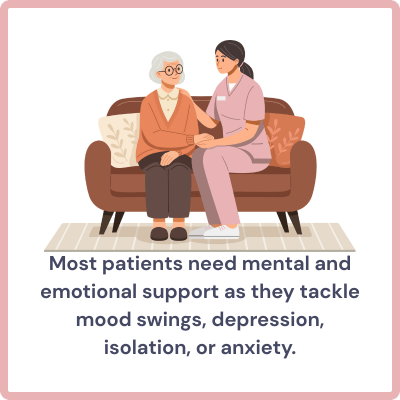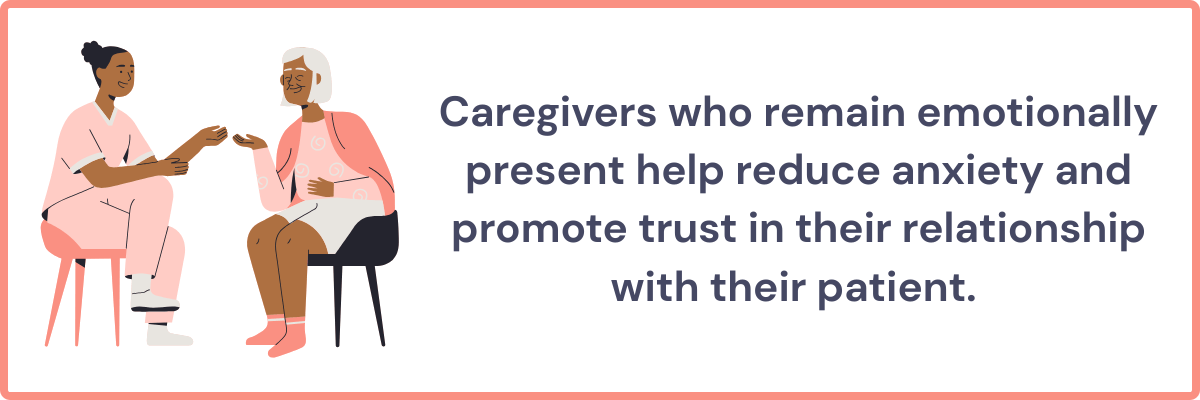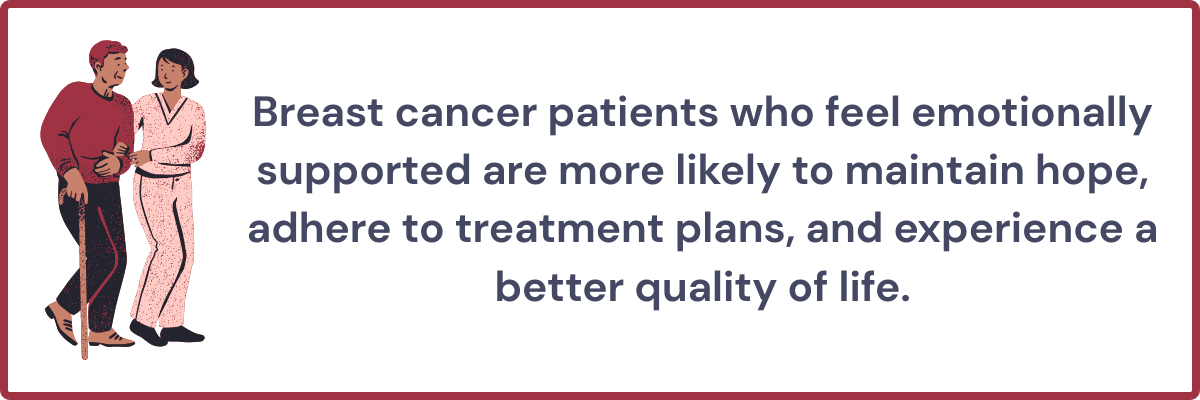Beyond medical care, emotional support from caregivers helps breast cancer patients regain confidence, reduce anxiety, and find healing at home through empathy and understanding.
Introduction
A breast cancer diagnosis changes everything. According to information from the National Cancer Institute on breast cancer, beyond the rigorous treatments and physical challenges, patients often face deep emotional struggles – fear, anxiety, loneliness, and uncertainty. During these vulnerable times, compassionate caregivers play an essential role not just in physical care, but in emotional healing as per American Cancer Society. In the comfort of home, caregivers can provide a steady source of empathy, reassurance, and human connection that helps patients navigate their cancer journey with hope and dignity.
This blog will address the emotional impact that breast cancer has on patients, then break down the importance of empathetic caregiving for breast cancer patients receiving care at home.
Understanding the Emotional Impact of Breast Cancer
Breast cancer affects more than just the patient’s physical wellbeing. It deeply impacts their mental and emotional state, as well. Many patients experience mood swings, depression, or anxiety as they adjust to changes in their health, appearance, and daily routines. Feelings of isolation may arise, especially for those recovering at home or unable to maintain their usual social activities. The National Cancer Institute offers guidance on coping emotionally after a cancer diagnosis.
Home care professionals recognize that emotional health is a vital part of recovery. By addressing deep feelings with compassion and understanding, caregivers help patients feel supported through every stage of treatment.
The Power of Empathy in Caregiving
Empathy is at the heart of exceptional home care. Caregivers who take time to listen, validate emotions, and offer comfort help patients feel seen and understood. A simple conversation, a gentle reassurance, or just sitting quietly beside someone who is processing their diagnosis can make a world of difference. The National Institute of Mental Health (NIMH) emphasizes that empathy and active listening are key elements of emotional resilience.
Empathetic caregivers understand that every individual’s emotional journey is unique. They adapt their approach, meeting the client where they are—whether that means providing quiet companionship or encouraging open discussions about fears and feelings.
Emotional Presence: The Gift of Being There
Emotional presence means more than completing tasks – it’s about offering genuine companionship and emotional availability. For breast cancer patients, having someone consistently there through treatments, fatigue, and recovery fosters a sense of safety and connection.
Caregivers who remain emotionally present help reduce anxiety and promote trust in their relationship with their patient. A calm, compassionate presence reassures patients that they’re not alone in this fight. That sense of continuity and care can often be as healing as medical treatment itself.
Supporting Mental Health During Cancer Recovery
Mental health support is a critical component of cancer care. Home care clinicians and caregivers can help patients by:
Encouraging communication
Allowing patients to express emotions without judgment.
Promoting positive routines
Gentle reminders for rest, meals, and hydration to maintain balance.
Fostering social connections
Helping patients stay in touch with family, friends, or support groups.
Watching for signs of depression or anxiety
Alerting family members or healthcare providers when additional support may be needed.
Through these actions, caregivers can help nurture both emotional resilience and overall well-being in their patients struggling with breast cancer diagnosis, treatment, and recovery.
Why Emotional Support Matters, Especially in Home Care
Patients who receive treatment in their home suffer more often from loneliness, making empathetic caregiving essential to treatment and recovery.
When home care treatment plans prioritize emotional and mental wellness, recovery outcomes often improve faster than if they were to focus on just physical outcomes. Breast cancer patients who feel emotionally supported are more likely to maintain hope, adhere to treatment plans, and experience a better quality of life.
Home care agencies that train clinicians and caregivers to prioritize empathy and emotional presence set themselves apart – building trust not just with patients, but with families who know their loved one is receiving truly holistic care.
Conclusion
The journey through breast cancer is overwhelming, both physically and emotionally. Having a compassionate caregiver by one’s side makes that journey a little less daunting. By practicing empathy and emotional presence, caregivers can guide patients through deep emotions like fear, anxiety, loneliness, and uncertainty. By focusing on mental health support, caregivers can encourage patients to nurture emotional resilience and keep family in the loop on how their loved one is handling their diagnosis, treatment, and recovery.
Empathetic caregiving can provide regular reassurance and human connection for breast cancer patients receiving treatment at home, ultimately allowing the patient to maintain hope and dignity throughout their cancer journey.
Frequently Asked Questions
-
Emotional support helps patients manage anxiety, fear, and isolation, promoting mental resilience and improving overall recovery outcomes at home.
-
Caregivers can listen actively, offer empathy, encourage emotional expression, and provide consistent companionship to support patients’ mental well-being.
-
Empathy allows caregivers to understand patients’ feelings, validate emotions, and build trust, enhancing emotional resilience during recovery.
-
Patients with emotional support often adhere better to treatments, experience less stress, and maintain a higher quality of life.
-
Encourage open communication, maintain daily routines, foster social connections, and monitor for signs of anxiety or depression.
-
Agencies can provide training in empathy, active listening, emotional presence, and mental health awareness tailored to cancer patients.
-
Yes. Regular caregiver presence and compassionate interaction help patients feel connected and less isolated during treatment.
-
Patients may experience anxiety, fear, depression, mood swings, and isolation while adjusting to treatment and lifestyle changes.
-
Families can provide companionship, encourage routines, participate in conversations, and coordinate with caregivers for holistic support.
-
Trusted resources include the National Cancer Institute, American Cancer Society, and mental health organizations focused on cancer recovery.
About CareVoyant
CareVoyant is a leading provider of cloud-based integrated enterprise-scale home health care software that can support all home-based services under ONE Software, ONE Patient, and ONE Employee, making it a Single System of Record. We support all home based services, including Home Care, Private Duty Nursing, Private Duty Non-Medical, Home and Community Based Services (HCBS), Home Health, Pediatric Home Care, and Outpatient Therapy at Home.
CareVoyant functions – Intake, Authorization Management, Scheduling, Clinical with Mobile options, eMAR/eTAR, Electronic Visit Verification (EVV), Billing/AR, Secure Messaging, Notification, Reporting, and Dashboards – streamline workflow, meet regulatory requirements, improve quality of care, optimize reimbursement, improve operational efficiency and agency bottom line.
For more information, please visit CareVoyant.com or call us at 1-888-463-6797.
Request for Information
To learn more about CareVoyant Software and how we improve the operational efficiency of Home Healthcare Agencies, contact us:










